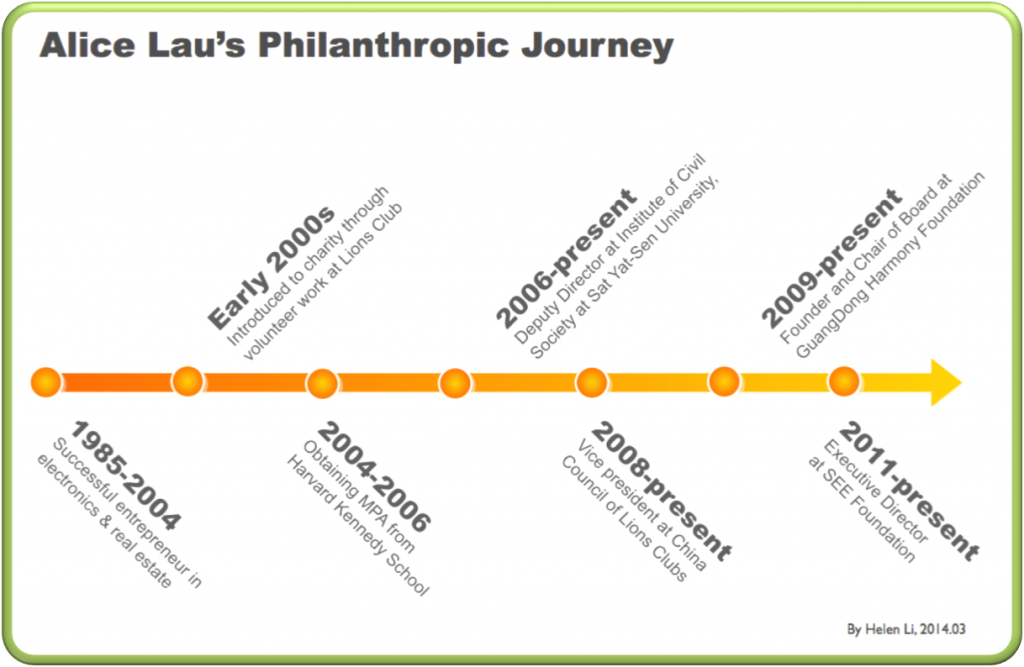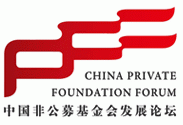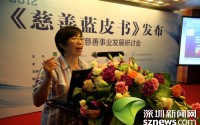Interview with Alice Lau (1) Finding Mission
For those who are not familiar with Alice Lau, she is a well-respected leader in Chinese philanthropy. She led a delegation of leaders in business and nonprofits on a study tour to Boston in December 2013. I had the privilege of working with the group and interviewing Alice Lau. I’m writing up the interview in 3 parts. This is part 1: Finding Mission. You may continue reading: Part 2: A Journey of Continuous Learning and Part 3: Belief in Civil Engagement.
To put the interview in context, please find a timeline of Alice’s philanthropic journey as follows:
[divider scroll_text=”SCROLL_TEXT”]
H: Since we are here at Harvard, let’s start from here. You got your MPA from Harvard Kennedy School in 2006. To my knowledge, it was not common, because back then, many Chinese came to HKS on fellowship, mostly from government and nonprofits. However, you were in business. Could you please talk about it?
A: I had been in business for 20 years, before coming to Harvard in 2004. Prior to that, I worked two years in government, but found the government job was so boring, then I quit. The business world was far more challenging and exciting compared to the government job, and I did learn a lot. But around 2003, I found myself losing momentum. Making more money didn’t seem to excite me any more, and I felt like wasting my precious life. I can’t take money with me when I die. What is the point of making more money? I started seriously considering a shift of focus in my life. I asked myself when I was the happiest, then realized charity work seemed to suit me well. I am easily touched, and I tend to gravitate toward things with a purpose.
H: How did you realize it? What kind of things would you consider as with a purpose?
A: When I was in business, every year around some major festivals, I would take my employees to visit nursery homes and help the elderly there. I was also involved with volunteer work at the Lions Club. Doing these things made me really happy. I donated to build a school in GuangXi province and went back to visit every year. When I saw the shiny eyes of the kids in the school and the progress they made, I was deeply touched, and felt my life was useful to others. This is something I’ve never felt in business. Overcoming business challenges was indeed satisfying, and it didn’t feel bad when pouring money on luxury bands. But these joys wouldn’t last, and didn’t make me feel useful. When I was doing charity work, the happiness was heartfelt. Maybe I was not made for business. I had to say 2003 was an extremely bad year in real estate. Honestly I don’t know whether I would think differently if the market had been booming back then.
Things were kind of weird, too. Just when I was thinking about taking charity work more seriously, a friend in the States told me there was indeed a major called “Nonprofit Management”. On hearing about it, I knew “That’s it.” So I shut down all my business, spending the next 8 months picking up my English, which I hadn’t used for over 20 years. My son gave me a book ranking graduate schools in the USA. I applied to four schools among the best in nonprofit management, and got accepted by 3 of them. In fact, I didn’t quite meet the criteria of Kennedy School. My TOEFL score was a little bit below the minimum. But I was really fortunate.
H: How was your experience at Harvard? Has it had any impact on your later work on philanthropy?
A: It was hard, but those two years was extremely helpful. I was 47 when I came to Harvard, and really appreciated the opportunity to get back to school, especially such a prestigious school, and among all these talented classmates from all over the world. I studied Monday through Sunday. Looking back I realize I pushed myself too hard. But at that time I kept reminded myself this would be the last time for me to study on campus, so I was really giving my 100%.
The study at Harvard really helped me in the way of thinking. Logic thinking had never been my strength, although I knew it was important. So I put in a lot of efforts into statistics, learning from the scratch. I ended up getting an A- on that course. It has served me very well in my later work. Another thing that has helped me is how the professors pushed us to think in class. Taking Dutch’s ( Herman Leonard ) class for example. I took his course on corporate citizenship. I remember a case on a corporation hiring a boy who was only 12 years old. It was apparently an unethical practice, but the boy was supporting a family with younger siblings and a disabled mother. What would you do? Lots of dilemma questions like that. He kept asking tough questions, one after another. I really didn’t know how to answer these questions, but Dutch wouldn’t let you go, and I ended up learning a lot. That teaching method is totally different from what I was used to in Chinese classrooms. It pushed me to think deeper and broader.
The mid-career track at Kennedy School took one year, and I spent the second year interning at Hitachi Foundation, where I had the opportunity to observe closely the daily operation of a large foundation, including the high-profiled board meetings. This internship was a great complement to the classroom study at Kennedy School.
H: Your stories are fascinating. The sluggish real estate market, your encounter with the field of nonprofit management, and the offer from HKS, all seem to be random…
A: [break in ] Yes, they look random, but I believe they were destined. When I look back at my life, so many things are beyond explanation. They led me to believe I have been guided to get where I am today. I don’t belong to any religion, but I consider myself strongly spiritual. I have increasingly realized that I came to this world with a mission.
H: A mission…
A: [affirmatively] My mission is not to do business. There seems to be an invisible force guiding me to get closer to my mission. Schooling and business experiences are all part of the preparation, so that I have adequate knowledge, skills and even financial freedom to do something greater. When he (she loosely used this word to refer to the invisible force) thought I was ready to fulfill my mission, he pushed me to stop my business practice, in a situation I would not want to linger even a moment longer in business. Then he paved ways for me to further my learning in my commitment to a new field (nonprofit). Now I’ve gone through the whole thing. Next? I’ve got to fulfill my mission. That’s how I look at it. I am just following my calling.
Up till today, the last 10 years has been the happiest time in my life. One thing I’ve learned – when you are self-centered, it is hard to be really satisfied. There is always someone richer than you, having more stuff than you, and doing better than you. Your world is only as large as yourself. But when you put your ego down, and allow other people and other causes to enter your world, your views will be expanded, and you will be far less stressed. [When saying this, she squeezed her hands into a small ball, then pulled them wide open, with a thoughtful smile on her face. ]





No Responses